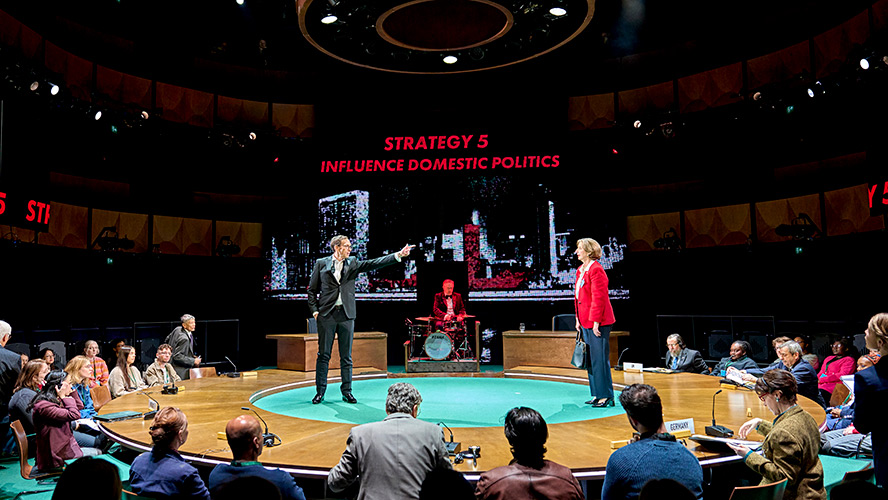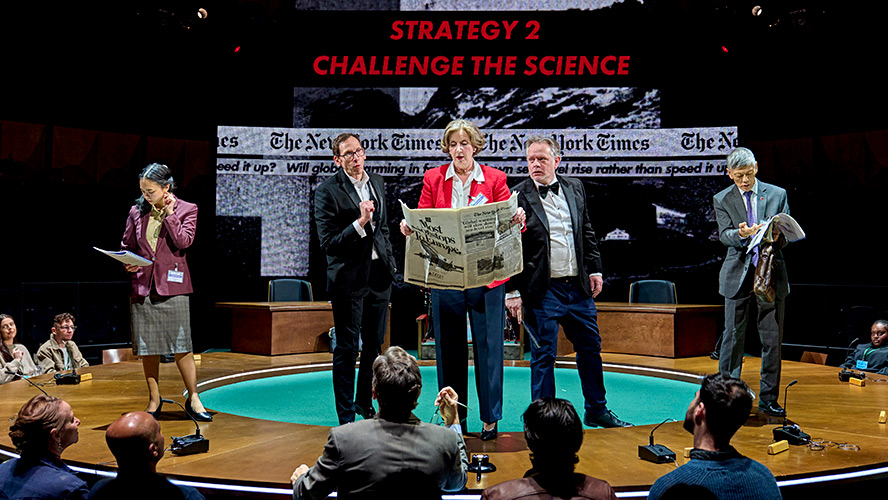Kyoto at Soho Place

Not even a week has past and this evening we went to the next show. This time Kyoto at sohoplace - the new theatre in the West End.
This play is not fiction, it’s modern history. A dramatization of the 1997 UN climate conference in Kyoto, which saw the signing of the first legally binding climate treaty.
Closing thoughts of the first act:
This is a damning representation of the USA, that does no favours in improving my view of it.
(hint: this view did not change in the second act)
Despite being about legal proceedings over scientific matters, the play is not at all dry. It’s word heavy, but still dynamic. It’s accessible without dumbing down the content. Delegates argue over specific words, meanings, even punctuation. With the bureaucracy we witness in local government, it’s not hard to believe this is how it actually happened.
The events of the play are various UN conferences culminating in the signing of the “Kyoto Protocol” in December 1997. Meanwhile an unlikely narrator, Don Pearlman, oil lobbyist, explains every meeting and conference, and meddles in every discussion to represent the interests of the global petroleum companies.
In a world of fake news and alternative facts, the anti-science rhetoric and political subterfuge made me feel slightly sick. Pearlman sees his role as to run the discussions into the ground, to prevent any agreement from being made. There’s a six step strategy for this:
- Be present in every second of the negotiations
- Challenge the science
- Double diplomacy. Say one thing to one country - and something completely different to another country
- Emphasise the cost of action
- Influence domestic politics
- Characted assassination

When I was at university, one of the lectures I enjoyed most was about voting systems. The context was creating voting algorithms - multiple systems with different preferences, how do they agree on something?
I’m not going into the details, but the core idea is that the rules of the vote affects which offer you should make.
When you were a child, you might have had to split a cake between yourself and someone else.
You cut, I choose.
Those are rules of the game. Then the oponent is incentivised to cut in half, because they know it’s in your interest to pick the bigger part. So the compromise is that both parts are the same size.
Now imagine a different rule
I offer a non-zero part of the cake. If you accept you get it. If you decline, I get the whole cake.
In this scenario, it makes sense only for me to offer you the smallest possible part of the cake. The options for me are: I get the whole cake or I get most of the cake. The options for you are: You get the piece I offer or you get nothing.
It should be obvious that this is not a fair system for two equal parties. But this is a common system - in shops for example.
But what if the rules give you more control?
I make an offer. If you accept, you get it. If you decline, we both get nothing.
What should my strategy be?
- If I offer you nothing, your options are you get nothing or we both get nothing. As it’s no change to you, you might vote for me to get nothing. This is bad for me.
- If I offer you a small piece of cake, I better be sure it meets your minimum cake requirement, otherwise you’ll decline and I’ll get nothing.
- I could ask you what your minimum requirement is, and offer you that. But what if you lie?
- The only thing I know for sure, is what my own minimum cake requirement is. So the only strategy that makes sense that I take my minimum requirement and offer you the rest.
- Either it’s still not enough for you, in which case we both get nothing, but there is no agreement that can be made.
- Or you accept and I have a piece of cake I’m happy with.
Although the conference ends with agreement, and Pearlman being ignored, it’s a hollow victory for the world. There is no sense that the delegate for the USA understands the meaning of the word compromise, and there are US representatives actively denying science and trampling on other countries. It’s kind of frustrating to watch.
I’m going to try not go on an anti-US rant right now, but this seems very similar to the USA of today. Lobbyists control the government (or even have seats in the government), a climate denier leads the country, and scarcely keep his train of thought between three words, let alone conversations between countries.
Don: It’s time to stop messing around. It’s time to burn it down. All of it. No prisoners. No mercy. Scorched fucking earth. Strategy Six. Character Assassination. If you can’t kill the science, kill the scientist.
And today we have (just one of many occasions) a different Don inciting death threats against a New York judge, and a coup against the government, and activiely dismantling the lives of normal people.
The USA is not portrayed in a good light in this play, and it just seems like the inception of a lot of the problems of today - where big companies got together and decided how they were going to fuck the world for everyone else.
It was a good production and I enjoyed it. I only wish I could be watching it 100+ years from now. Either everything predicted has come to pass and people will look back on this as the beginning of the end, or countries will have come together to fix the problems, and the Trumps of the world will say “clearly it wasn’t a problem, so why did everyone complain about it”.
Unfortunately my expectation is the former.